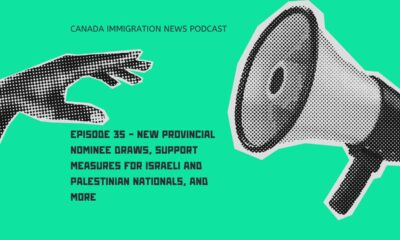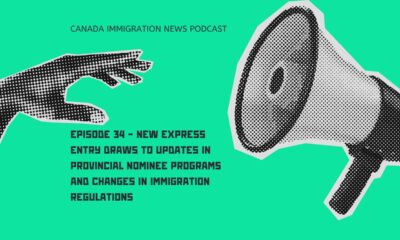Episode 7 – Provincial Updates, Detention Debate & More!


Welcome back to Canada Immigration News Podcast! Your one-stop shop for everything Canadian immigration, from policy updates to inspiring stories. Today’s episode dives into a variety of news from across the country, including exciting developments in Manitoba and Saskatchewan, a controversial proposal by the federal government, and new regulations in New Brunswick.
Manitoba Extends Status for Potential PNP Nominees
First up, some great news for skilled workers in Manitoba! On May 8th, 2024, Immigration, Refugees and Citizenship Canada (IRCC) approved Manitoba’s request to extend the temporary resident status of potential nominees under the Manitoba Provincial Nominee Program (MPNP).
This primarily applies to post-graduation work permit holders whose permits are set to expire in 2024. With this extension, approximately 6,700 temporary workers can continue working in Manitoba while their permanent residence applications are being processed. The expectation is that eligible individuals will receive provincial nominations within two years, paving the way for permanent residency.
This is a positive example of collaboration between the federal and provincial governments to support skilled workers aiming to build their lives in Canada. It’s important to note that while this specific measure applies to Manitoba, IRCC is open to exploring similar options with other provinces to facilitate the transition of more temporary residents to permanent residence status.
Federal Government Faces Backlash Over Immigration Detention Proposal
Shifting gears, we have a more contentious topic. The Canadian government’s recent budget proposal to detain immigrants in federal prisons has sparked significant criticism from human rights groups.
These groups argue that detaining immigrants in federal facilities could expose them to harsh conditions and contradict Canadian values. Their concerns stem from the fact that immigration detainees, who may be inadmissible due to criminal activity or human rights violations, have fewer rights than regular prisoners. Additionally, critics highlight the potential for human rights violations and indefinite detention.
The government maintains that detainees will be housed in separate areas of federal prisons and that existing holding facilities with a capacity of nearly 500 people could be used. However, the proposal continues to face strong opposition.
Changes to Saskatchewan’s PNP: Excluded Occupations & More
Now, let’s explore some news from Saskatchewan. The Saskatchewan Immigrant Nominee Program (SINP) recently updated its list of occupations excluded from applying under the Occupations In-Demand and Express Entry sub-categories.
This update expands the exclusion list to 158 occupations, with eight new additions. However, there’s also some positive news! Veterinarians and veterinary technicians have been removed from the list, making them eligible for these sub-categories.
What does this mean for you? If you’re targeting Saskatchewan’s PNP, it’s crucial to check the updated list of excluded occupations to ensure your eligibility. Generally, occupations categorized under NOC TEER 4 and 5 are also not suited for these PNP sub-categories.
Important note: These changes specifically apply to the Saskatchewan PNP and do not affect the federal Express Entry program or its criteria. It’s worth mentioning that Saskatchewan has been increasingly focusing on attracting specific occupations and nationalities through its PNP draws.
New Brunswick Strengthens Oversight of Private Career Colleges
Finally, we head to New Brunswick, where the provincial government recently introduced legislative amendments to enhance oversight of private career colleges. These amendments aim to improve student protection and accountability within these institutions.
Here are some key highlights of the changes:
– Establishment of a formal complaint mechanism for students.
– Increased government authority to set program and service standards.
– Regulations for student record retention and protection.
– Streamlined registration process for training organizations.
– Introduction of a compliance order system for addressing issues.
These changes aim to promote transparency and accountability within private career colleges in New Brunswick.
That wraps up our episode today! Remember, staying informed is key throughout your Canadian immigration journey.
Do you have any questions about the topics we discussed today? Leave a comment below and let’s chat! We’d also love to hear your suggestions for future episodes.


























